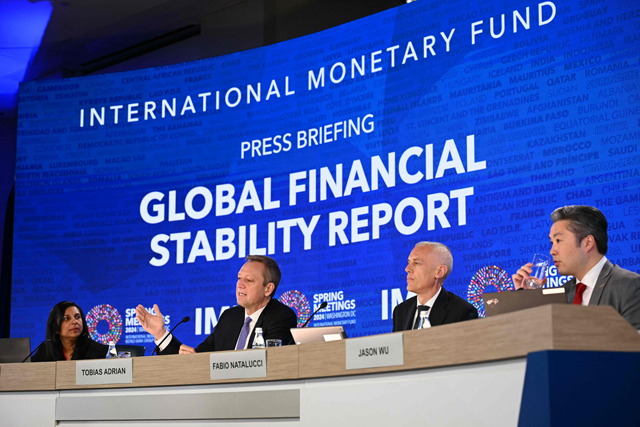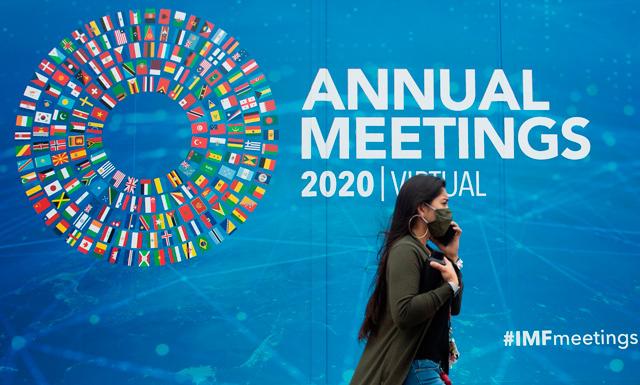You are here
Carbon pricing crucial for affordable climate policy — IMF official
By AFP - Oct 11,2023 - Last updated at Oct 11,2023
MARRAKESH — Charging companies for the carbon they produce will be a crucial part of the policy mix to deliver global climate goals while avoiding soaring public debt, the International Monetary Fund's (IMF) fiscal affairs chief has told AFP.
The IMF warned in a recent report that relying solely on scaling existing spending measures to deliver climate objectives could raise debt by as much as 50 per cent of gross domestic product (GDP) by the middle of this century.
Adopting a new policy mix which includes an emissions trading scheme or carbon tax would significantly ease the long-term impact of the climate transition on government debt levels, according to the IMF's Fiscal Monitor report.
"Carbon pricing is the single most efficient and effective instrument and so it's a very important component of a viable package," Vitor Gaspar told AFP ahead of the IMF and World Bank's annual meetings in Marrakesh.
Such a package would rely heavily on carbon pricing, "complemented by other instruments", like targeted subsidies, and financial support for vulnerable households, he said.
"If carbon emissions are appropriately priced, the ability to mobilise the financial creativity of the private sector improves quite substantially," he added.
Balancing act
As the world transitions to renewable energy, global leaders must find a balance to affordably tackling climate change while absorbing an expected surge in energy use among developing economies, according to Gaspar.
Close to 50 countries have carbon pricing schemes in place, and more than 20 are contemplating their introduction, according to the IMF.
Developing economies are not responsible for the vast majority of emissions, he continued, and are rightly focused on connecting more of their citizens to the electricity grid as they look to eradicate extreme poverty and alleviate hunger.
As a result, "the climate strategy has to be compatible not only with green technologies and the green transition, but also with quite a massive increase in energy production," he said.
"So it's not an issue of energy mix only, it's also about scaling up energy to an extent which is enormous," he added.
Interest rate woes
One immediate concern for policymakers around the world is the recent surge in borrowing costs.
Like many central banks, the US Federal Reserve has embarked on an aggressive campaign of interest hikes in a bid to slow surging inflation — with some success.
In its World Economic Outlook report published on Tuesday, the IMF slightly lowered the US inflation forecast for this year to 4.1 per cent from 4.4 per cent in July.
But the IMF's expectation for headline global inflation rose 0.1 per centage points to 6.9 per cent this year, due to a jump in its forecast for inflation in emerging market and developing economies.
The IMF also raised its global inflation forecast for 2024 by 0.6 per centage points to 5.8 per cent, indicating that "returning inflation to target is expected to take until at least 2025 in most cases".
Higher interest rates raise the cost of funding government deficits, causing financial headaches for developing economies, where interest repayments make up a larger percentage of overall government expenditure.
"Clearly, interest rate increases and increasing borrowing costs and interest expenses on budget is a challenge that affects almost all countries around the world," Gaspar said. "It's a very big deal."
The IMF is seeking to convince member countries attending the meetings in Marrakesh to increase the level of quotas they all pay to fund it, and also to replenish depleted lending facilities for low- and middle-income countries.
"It's very important to reinforce the role of the IMF at the centre of the global financial safety net," Gaspar said, adding that increasing the resources that the fund can mobilise "is particularly important".
Related Articles
WASHINGTON — The International Monetary Fund (IMF) has slightly upgraded its outlook for global growth this year on the back of resilient se
WASHINGTON — The International Monetary Fund (IMF) has raised its outlook for the global economy this year, while maintaining a gloomy forec
WASHINGTON — As demands increase on their limited resources, governments will need to raise taxes on wealthier families and firms and target


















